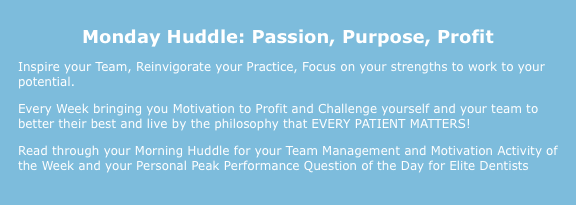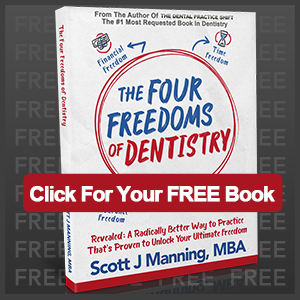Speaking of rewarding yourself (from last week), this is really the secret to influencing more patient to accept treatment. Who doesn’t want a reward and, by the way, generally speaking who doesn’t think they deserve one once in a while.
There is way too much emphasis on the ‘selling’ of dentistry and not enough emphasis on ‘selling’ the reward to the Patient.
This goes beyond my concept of “deserve” although that is very important and it is as simple as telling the patient that they do deserve to get this done, to make this happen, to fix their mouth, improve their smile, and get their health back.
It gets to the root of the human desire to feel good about themselves and that most people think that everyone else catches a break except them.
The secret is extrapolating the benefits to the patients and helping them see into the future of what the difference will be and why it matters.
Think about it, how many people would do anything ‘difficult’ if they didn’t want to achieve the outcome at the end.
In patients’ minds they don’t want to have dentistry done, they don’t want to ‘spend’ money on something they think they don’t have to do, and they don’t want to take up the time. There are a lot of barriers – unless – it is something the patient has developed enough value over and belief in that they do want this.
That is usually either driven by some sense of urgency, usually pain, or possibly something in their lives motivating them in another way. On the flip side, they will do not move forward if it is not urgent (to them) and it doesn’t need to be done now or possibly at all (to them). Patients will always justify in their minds why they can wait.
We have to overcome that by building up the reasons why the reward and benefit is worth more and needs to happen sooner rather than later.
Once the value of moving forward and the final outcome weighs more in the patients’ minds than the time, money, alternative, etc – you have helped the patient win.
Sometimes the greatest motivator is ‘why not now’ because ‘you deserve this.’ In last week’s report, I talked about the feeling of ‘love’ and how powerful caring about someone else and expressing your desire for them to have what is in their best interest really does move people forward at least to open their minds and listen.
If you want patients to listen to you, you have to listen to them. When you do listen to them, they will always give you an opening as to what would be their most desired reward or benefit they could receive from doing whatever it is that you recommend. Once you hear that or you discover it or you pull it out of them – then you got it and you can’t let it go.
Some practices have the patients self-describe their goal or victory. They might just bluntly ask, as you should, “What would having xyz mean to you?” You have the patient answer their own question about WHY and you let them establish their own reward.
The morale of this week’s Huddle is just like you need something to motivate you and to look forward to – so do your patients.
Not a lot of people are going to be looking forward to the process they have to go through with the treatment plan, they aren’t going to be looking forward to the investment of the time or the money – instead they are going to look forward to the outcome, benefits, and rewards. That is your gateway to yes.
And once you give them the challenge and the path to achieve their victory, then they’ll be on your side working with you to help themselves and that’s when you know you have a motivated patients.
Practice this, work on focusing on the reward for the patients’ decisions, and give them the challenge of what they deserve to have. If you fight for their best interest, pretty soon they’ll be fighting too – with you, not against you.
This is why I always say you don’t have to sell dentistry at all. In fact, the less you talk about the what and the how, and instead emphasize the why and the reward, the more patients you’ll help because they’ll be wanting to help themselves.



